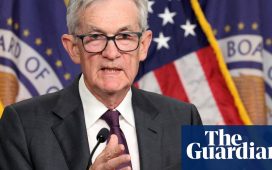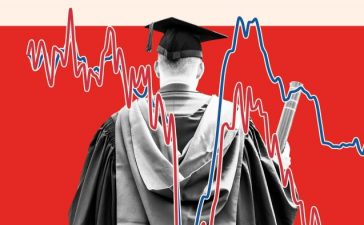Joe Biden is out of the race for the White House and “Bidenomics” – the agenda he used to guide the world’s largest economy – looks like its time is over too. For his replacement, Kamala Harris, it’s all about the “opportunity economy”.
At a rally in North Carolina, Harris adopted the new slogan to capture her core ideals.
“As president, I will be laser-focused on creating opportunities for the middle class that advance their economic security, stability and dignity,” she said. “Together, we will be build what I will call an ‘opportunity economy’.”
The switch from Biden to Harris at the top of Democratic ticket has sparked an early turnaround in the party’s fortunes as she and Donald Trump head to the polls in November, but convincing Americans that there is anything like joy in the current economy will be a challenge.
At his own rally in North Carolina on Wednesday, Trump hammered his opponents over inflation. “I don’t order bacon anymore,” he claimed. “It’s gotten too expensive.”
Friday’s speech offered the most specific economic proposals Harris’s campaign has released so far. While it largely follows the policies Democrats pursued under Biden, Harris is placing a heavier emphasis on bringing prices down.
Harris said that Biden helped create 16m new jobs and brought inflation down to under 3% after Covid shut down the economy.
“Still, we know that many Americans don’t yet feel that progress in their daily lives,” she noted. “Costs are still high, and on a deeper level, for too many people, no matter how much they work, it feels so hard just to get ahead.”
It is an acknowledgement that even if the economy has surged on from Covid, it still feels off to many Americans. It’s also a subtle turn from Bidenomics, which put more focus on manufacturing and infrastructure.
Bidenomics was praised by economists as some of the most progressive domestic policies that have come out of the White House, but the president’s campaign appeared to struggle with selling the platform to the public.
In a Harris poll for the Guardian conducted in May, 70% of Republicans and 39% of Democrats indicated they believe Biden was making the economy worse. Meanwhile, over half of all polled believed the US was experiencing a recession.
The US has technically not been in a recession, generally defined as a decrease in economic activity, as measured by gross domestic product (GDP), over two quarters, but Americans for years have reported feeling like the economy was off – more of a “vibecession” than an actual recession. Much of that has to do with prices.
While inflation has fallen back to its lowest level since 2021 after peaking at 9.1% in June 2022, the highest level in a generation, over two years of inflation has left many voters unhappy.
“Prices are still too high,” Harris said on Friday. “Look, the bills add up: food, rent, gas, back to school, clothes, prescription medication. After all that, for many families, there’s not much left at the end of the month.”
Harris said on Friday that she would work to restore and expand the child tax credit first seen in the Covid-era American Rescue Plan, providing a $3,600 tax credit per child for working- and middle-class families. She is also proposing a new $6,000 credit for families with children in the first year of life.
The plan also outlined the basic details of a four-year plan to lower housing costs, including building 3m new housing units, creating tax incentives for starter home construction and expanding down-payment support for first-time homeowners.
But at the heart of her plan were policies aimed at the grocery store, where she said her administration will propose a federal ban on price gouging on food and groceries to “bring down Americans’ grocery costs and keep inflation in check”.
The campaign emphasized the proposals are just one part of Harris’s economic platform and outlined broader goals, including strengthening Social Security and Medicare, lowering the cost of education and childcare and empowering workers to bargain for higher wages.
A recent FT/University of Michigan poll showed Harris has a sliver of an edge over Trump when it comes to who voters trust to handle the economy. And in its monthly consumer sentiment survey, the University of Michigan found that consumer sentiments rose slightly in early August for the first time in five months, probably as a result of Harris entering the race.
She is testing out lines of attack that could dent confidence in Trump’s ability to oversee the economy. Criticizing his plan for widespread tariffs on foreign imports, and warning the move would “devastate” the country, Harris dubbed it “a Trump tax on gas, a Trump tax on food, a Trump tax on clothing, a Trump tax on over-the-counter medication”.
High levels of uncertainty around the US economy’s direction were underlined this month by a brief meltdown on Wall Street in the wake of July’s unemployment data. The next three months may be a bumpy ride.
Harris is trying to pitch herself as a challenger who can help make the economy work for all. “Now is the time to chart a new way forward to build an America where everyone’s work is rewarded and where talents are valued,” the vice-president said. “And where everyone has the opportunity not just to get by, but to get ahead.”
She has 80 days to make her case.









